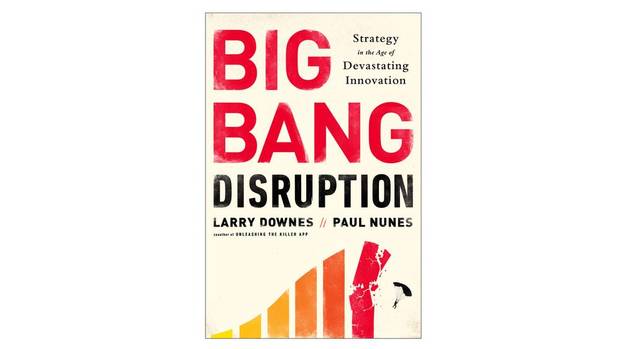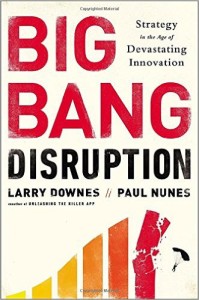Disruption is not new.
We have all seen it occur in many industries and companies.
Clayton Christensen detailed it in The Innovators Dilemma.
In fact disruption is becoming one of those over-used buzz words.
However, to the owners and employees of affected businesses and industries, disruption is real and life altering.
Lots has been written about disruption but the distinction that Big Bang Disruption draws is the speed and completeness of an industry or corporate disruption that is now possible due to the availability of “exponential technologies”. Because of this, authors Larry Downs and Paul Nunes argue that there is a new product life cycle model that now exists they call “the shark fin”. This product life cycle is different from earlier product adoption cycles such as that described by Geoffrey Moore in Crossing the Chasm in that adoption can occur rapidly across entire markets, almost without warning, deemed “catastrophic success“. Similarly, as a new product saturates a market it can be just as quickly surpassed or abandoned, leading to rapid decline in market share. The authors lay out 12 rules that help govern strategic planning to help deal with big bang disruption both as disruptee and disruptor. Here are my take-aways.
Takeaway #1: Incumbent companies should be paranoid and humble
If your business strategy or product planning cycle starts with what you did last year and tunes or tweaks from there, you are doomed. Startups, hack-a-thon participants or savvy accelerator participants can use combinatorial innovation and successive market experimentation to arrive at a new product or service, sometimes in plain sight, with a short time to market that can be rapidly adopted. Incumbents must tear themselves away from the false security of established products market share and begin using these same techniques to find new combinations of features, technology and business models that can gain future traction in their market place. The arrogance that accompanies market leadership can prevent an incumbent from believing that their current product is doomed. A humble approach will allow them to view the market and their products with more realistic eyes and begin asking the questions that will help reveal what experiments need to be executed. You can work to disrupt yourself, or some other company or hustling individual will do it for you.
Takeaway #2: Ability to scale quickly in either direction is crucial to survival
To avoid ‘catastrophic success’ a business that has hit upon a big bang disruptor, must be able to scale their offering to meet the almost vertical demand that comes with ‘the shark fin’ model. This could impact computing resources, manufacturing capacity or actual head count or all of them. Similarly, when a business hits the saturation point it must be capable of scaling back quickly so that it is not caught with excess capacity, inventory or other resources that increase expenses during a time of rapidly declining revenue for that product.
Takeaway #3: Industries, companies and individuals will be disrupted, ready or not
Exponential technologies lower the barriers to potential disruption drastically. Market experimentation is also dramatically easier. The historical moats of market protection, such as high capital investment, intensive information or computing resources or large manufacturing requirements are gone. Social networks, crowd funding, contract manufacturing and big data as a service make product discovery more direct and fluid. Downs and Nunes lay out 12 rules to help adapt to big bang disruption that apply across the 4 phases of the ‘shark fin’ product cycle. They describe them like this:
“These are not rules that speak just to the CEO or any other individual member of the executive team. As these clear, though sometimes counterintuitive, imperatives suggest, creating and surviving Big Bang Disruptors requires substantial change throughout our organization. Every part of your business is affected from strategic planning to marketing and sales, design and manufacturing, finance, technology, research and development, human resources, even legal. The rules of Big Bang Disruption, in short, apply to every leader and every employee in your business.”
Just as they state the rules apply to everyone, the effects of being disrupted apply to industries, companies and individuals, leadership or rank-n-file. Although Downs and Nunes do not discuss the disruption of individual employees I believe that these concepts apply there too. Think bank tellers.
Takeaway #4: A business must not ignore the power of “near perfect market information“
The advent of internet search with tools like Google or Bing, coupled with the power of user review and the personal sharing capability of social networks make large amounts of information about your product or service that you cannot directly control easy for a potential consumer to obtain. These days a prospect for your product is most likely to check review sites like Yelp, Amazon or forums like Reddit to check your product. And, as the authors note, most folks start with the negative reviews. They tap their social networks. They reads blogs and other independent reviews for information on your product. They check out affiliate marketing sites that do heads up comparisons on features and usage. In many cases, your potential customers know more about your product (or its perception) that you do as the business owner or manager.
As the authors note:
“Information barriers keeping consumers from determining price, availability, or the quality of goods and of post-sales support have also been disrupted. Companies can’t easily hide behind slick marketing campaigns or the strength of established brands. Each product lives or dies on its own merits, including that of it customer service and its fate is determined not in the past or future but right now.”
So what?
Following the 12 rules laid out in Big Bang Disruption will certainly help business be more aware and stay better attuned to the forces of disruption in their industry. Big Bang Disruption provides an actionable roadmap to adapt and be disruptive in their own right.
For business owners and executives, ignore the advice of Big Bang Disruption at your own peril.
Big Bang Disruption by Larry Downes and Paul Nunes

